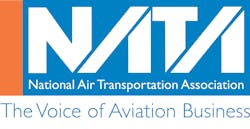What's Going on with NFPA 407?
The National Fire Protection Association’s (NFPA) standard for aircraft fuel servicing in the United States, NFPA 407, lays out requirements for the safe refueling of aircraft. The standard applies to fuel farms, self-serves, mobile refuelers and other fueling operations.
The NFPA undergoes regular reviews and there were some changes in the 2017 version which require both new and existing equipment to have automatic overfill devices installed at airport fuel loading racks by June 2 of this year.
According to the National Air Transportation Association’s (NATA) GA Fuel Handling Subcommittee, these additional over-fill protection systems are not necessary.
“Essentially, these automatic over-fill devices communicate electronically with fuel trucks to shut down the pump when the truck becomes full,” said Steve Berry, NATA’s manager of fuel quality and safety.
Though these overfill protection devices work well, Berry says there is not enough data to prove they are necessary.
“The requirements and operational procedures we have in place now have a demonstrated history of reliability. Every fuel truck in use at airports today already has a high-level shut-off device installed,” he notes. “While those manufactured in the last few years have two high-level devices installed. These devices, commonly called jet-level sensors, have been a requirement of the 407 for decades. And you also have what’s known as a dead-man device. Basically, it’s a device that you have to hold while you’re performing the bottom loading operation. If you release it, the fuel flow stops.”
The over-fill protection devices on fuel trucks are tested before every bottom load operation to ensure they’re working properly. Berry notes this process has worked since he’s been in the industry — almost 20 years.
“The overfilling of mobile refuelers is just simply not a statistically relevant issue,” he says. “It just doesn’t happen with the kind of frequency that would justify such a wide-sweeping change and expense across the entire industry.”
Adding additional overfill safety devices could cause major logistical issues.
“In the general aviation industry, the majority of fuel trucks are leased from the major fuel suppliers,” he notes. “And so, you’ve got a fleet of tens of thousands of trucks out there all across the country that are going to have to be retrofitted to meet whatever system ends up being installed at the airport.”
Berry says if these requirements are enforced, there will have to be great communication between the airports and the owners of the fleet trucks to make sure the truck has the same fueling system as the airport.
“There’s also the issue of emergency situations. Any time there’s wildfire season out west, for example, fuel suppliers will send trucks to support the need for additional fueling operations,” he mentions. “These trucks get moved around the country all the time to support the critical fueling operations our country needs. So, when we add this extra step in there, we’re talking about having to retrofit these trucks before they can get shipped out. It just creates and compounds a logistical problem.”
There is also a major cost involved with retrofitting all these trucks to meet the new standards. Berry estimates it to be around $100 million after taking into account all the public-use airports.
Berry and other members of the NATA were working to overturn this regulation with TIA 1558. Their initiative fell short of passing by four votes. NATA members requested a hearing in order to appeal that ruling, but it was denied by the NFPA Standards Council. In a press release sent on April 30, NATA wrote it, "filed a Notice of Intent to Petition the NFPA Board of Directors as a final effort to seek relief from these onerous requirements."
NATA currently encourages FBOs and other fuel providers to work with their Authority Having Jurisdiction (AHJ) to, "request a modification to the retroactive component of the requirements," which would prevent existing equipment from being subject to the June 2 deadline for compliance.
